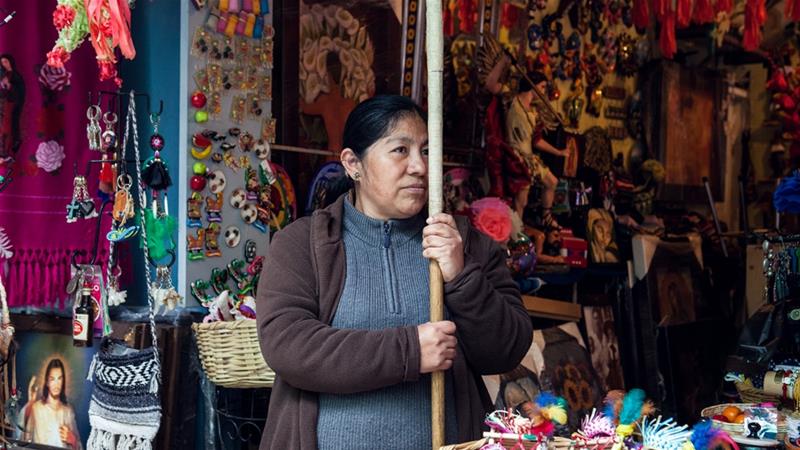Former Mexican President Vicente Fox made international headlines when he tweeted to US President Donald Trump, «Mexico is not going to pay for that f****** wall.»
But beyond the sensationalism over who’s going to foot the bill for Trump’s project – reportedly set to cost as much as $21.6bn, local businesses say they are already paying dearly.
On the Mexican side, shops usually crowded with tourists are empty.
«I would like to hit him with this one,» she said shaking a baton she uses to reach merchandise sitting high up on her store shelves. «He’s crazy.»»People are afraid to come,» said Elia, 48, who estimates that her business has decreased by 60 percent amid Trump’s talk about the wall.
Sebastian Alexis, 16, sells woven ponchos, Frida Kahlo memorabilia, terracotta pots, papier-mache statuettes and other traditional Mexican goods at wholesale prices. He used to have many customers from the United States who bought his items as souvenirs or for resale across the border, he explained.
«[But] the action for the wall has made less people come,» Alexis added.
A string of pharmacies in the city centre that usually sees a constant flow of foot traffic from US citizens looking to supplement expensive healthcare with cheap pharmaceuticals were also suddenly empty.
«We won’t have problems [with business]. The problems will be on the other side of the frontier. Medicine is expensive there, not here,» said Arturo Roya, 54, one of the pharmacy workers.
Another nearby pharmacy worker, Esteban Ochoa, 64, estimated that his business had decreased by «20 percent because of the proclamation».
Ochoa said he is concerned for people over the border in the US without the means to pay for healthcare. «It’s possible that people won’t be able to survive. There are many people who come here who can’t afford medical care there,» he explained.
Less than a kilometre from Tijuana, in the US city of San Diego, Sunil Gakhreja, the owner of Sunny Perfumes, says that nearly all of his business comes from Mexico. Days before Valentine’s Day, this is typically his busiest season. Mexicans come here to buy in bulk and resell American perfumes at higher prices in Mexico.On the US side of the border
«You see: in the past 10-15 minutes, hardly any customers come in,» he said. «I don’t even check my books. There’s no point getting more depressed.»
Uncertainty in other facets of American life has meant that «everyone is holding their money,» he said. Trump «is a businessman; he should think about business first».People are afraid to cross the border. «Like even when I cross, I don’t know when I’m coming back,» added Gakhreja, who is an American of Indian descent whose wife and children are Americans of Mexican descent.
Gakhreja worries that this is a sign of things to come for his business.
«Basically, we are going to see another recession,» he speculated.
As he talks, a young woman comes in and purchases a $2.50 bottle of perfume and leaves.
One Mexican American store owner on the US side of the border began to grant Al Jazeera an interview, but then asked not to go on the record, saying that he feared retaliation from the authorities and citing the Trump administration’s stance on Muslim American immigrants and the press.
Compounding the potential human suffering caused by Trump’s proposed wall and deportation projects, activists say, are potentially catastrophic environmental effects.Environmental effects
Many migrants complain of a lack of toilet facilities and access to water. In 2010, the United Nations General Assembly voted to recognise access to water and sanitation services as a human right. It is one that these people are denied. One man who had been deported from the US and who spoke to Al Jazeera on the streets of Tijuana’s Northern Zone complained that he did not have anywhere to wash or go to the toilet.
There is no rubbish collection in these parts of Tijuana as they are difficult for rubbish collection trucks to access, notes social justice advocate and longtime Tijuana resident Susan Smith. Rubbish dots the walkway from the canyon back to the pavement. On the dirt road, a malodorous fire burns in the distance.
Similar to US cities which struggle with rampant homelessness, such as San Francisco, find a build-up of human excrement in the streets, the same exists in a Tijuana confronted with a suddenly larger homeless population.
Ecological implications
Environmentalists expressed their concerns over the ecological implications of the wall.
«Trump’s proposed border wall would be devastating for people and animals that have migrated for centuries across the US’s southern border with Mexico,» said Monica Embrey, senior energy and climate campaigner at international environmentalist organisation Greenpeace.
The president of environmental non-profit Defenders of Wildlife, Jamie Rappaport Clark, has issued a statement saying that the wall would «bisect and isolate iconic southwestern landscapes and push vulnerable borderland species, such as jaguars, Mexican grey wolves and ocelots, to the brink of extinction».
Rebecca Hinojosa is a Tejana – a Mexican American from Texas – community organiser with the Texas Sierra Club, whose own family has lived at the border between the US and Mexico for generations.
«From one end of the border in Tijuana, California to the other end in Brownsville, Texas, over 37 federal laws that protect indigenous peoples, our environment and wildlife must be waived and ignored in order to create a pathway for the border wall,» she said via email.
«The violence of the wall includes severing a wildlife corridor for endangered species and seizing poor people’s land by eminent domain. Border walls also often act as hazardous dams. Rainfall washes plants and trash against the metal pillars and the water pours downslope into poor communities that are already without drainage infrastructure,» she added.
Hinojosa, like many in Tijuana, cites past precedent with the existing border walls when discussing the potential ramifications of Trump’s bid.
«In 2008, the section of wall that bisects the Arizona/Sonora border backed water up to over six feet deep; two people drowned and residents suffered millions of dollars of damage. Border communities, from Tijuana to Rio Grande Valley of Texas, experience generational poverty and yet the Trump administration is fixated on spending billions of dollars for walls that do nothing but act as monuments to racism.»
A ‘low-intensity conflict zone’
By a section of the wall not far from where Alfredo, who lives in a shelter for deportees on Tijuana Beach, and dozens of other migrants sleep, social justice advocate Smith shows Al Jazeera new additions made to the wall under the Obama administration and what they have done to her city.
Beyond the grating on the American side, peeking out from the darkness at night, as Smith speaks to Al Jazeera, US Border Patrol vehicles are parked or idling with their headlights on at various points across the barrier. In certain parts, where the headlights show through grating, they are almost ghostly.»The wall is always being updated and repaired,» she said. Last year, lighting and access roads were carved into the landscape. «You could do laser light surgery with the lights. Blinding lights.»
Helicopters occasionally circle overhead.
It already looks, Smith says, like a «low-intensity conflict zone». It remains unclear what Tijuana with a new border wall will look like.
Smith, who is a Buddhist, worked to erect a monument on the Mexican side of the wall commemorating the signing of the Treaty of Tlatelolco, a nuclear non-proliferation agreement of Latin American states that on February 14 had its 50th anniversary. For her, this is the only construction this area needs. She hopes to plant a tree beside the monument.
She hopes that someday, Tijuana families will be able to picnic there.
* Names changed to conceal their identities.


